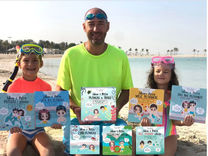Blog guest: Julie-ann James, CEO at Aquababies Global
- Sep 30, 2019
- 3 min read
Updated: Apr 1, 2020
Julie-ann James dedicated her life to research, education and the creation of the best family water programme for baby swimming and the whole family. “Coming from a childhood of competitive swimming in Australia whereby you had to swim 4 hours a day takes a lot of focus drive and dedication. I applied these qualities into many years of researching Baby and Toddler swimming to develop a structured program that is now tried and tested successfully around the world.”
Today, Julie-ann James is a leading global consultant on baby swimming as well as the founder one of the most successful baby swimming schools.
She travels to countries to qualify coaches with the STA qualifications then train them with the Aquababies or Parent & Baby Aqua (PABA) programmes. Her workshops and trainings are globally present from Australia, New Zealand over Thailand and China to the UK.
Julie-ann James, as a Swimming Dad #Blog guest, with her thirty year long experience, talks about: what the best age to start is in order to achieve best results, what the actual role of the parent in baby swimming is and if daddies are more active with the babies in the water.
From your experience, how important is the role of parents when babies need to get familiar with the water?
I feel the role of a teacher should be to educate the parents to explain why babies react the way they do in the water and to help manage their expectations., e.g. natural reflex’s and development stages of children will determine what they can or can’t do. The technique of teaching babies and toddlers should be different, babies learn by the senses, so a nice gentle class not too much signing is ideal. A toddler is more active to encourage co-ordination but for both age groups play time and fun should be the main focus.
What is the best time to start with baby swimming classes (what age) to achieve the best "results"?
I believe the younger the better, originally baby swimming was recommended for new-borns for health properties eg breathing difficulties and to strengthen them. My classes start from 6 weeks, when it is considered safe for mothers, but I also encourage dads to take the baby earlier if they are confident to do so. Swimming has so many health benefits, taking your child swimming can encourage better eating and sleeping patterns.
Who's easier to relax in water, babies or parents?
It’s a combination of both, in my view teaching should be explanation demonstration then correction. If you explain, then demonstrate with the child then correct the parent if they are not holding the child properly then you are working both parent child and helping them both to relax.
More and more, dads are included in the baby swimming lessons. Does this mean that they are more careful, and that a certain prejudice in the "modern" parenting in the water has disappeared, or is it just their new creative time with the babies?
It’s important that dads find activities that they too enjoy with their baby, swimming is quality time and the natural sensory aspect means that its wonderful bonding activity! Is baby swimming fad of modern times or simply swimming evolution through time of needs that is a boon for mom, dad and baby?
Is baby swimming just a trendy consequence of the “new age” parenting or simply an evolution through time - a need that is beneficial for both mum, dad and a baby?
Baby swimming techniques has evolved due to research being more readily available for teachers, I personally have been travelling and researching for 30 years so it’s a not a new concept.
To find out more about Julie-ann James and Aquababies Global visit www.aquababiesglobal.com


























































Comments